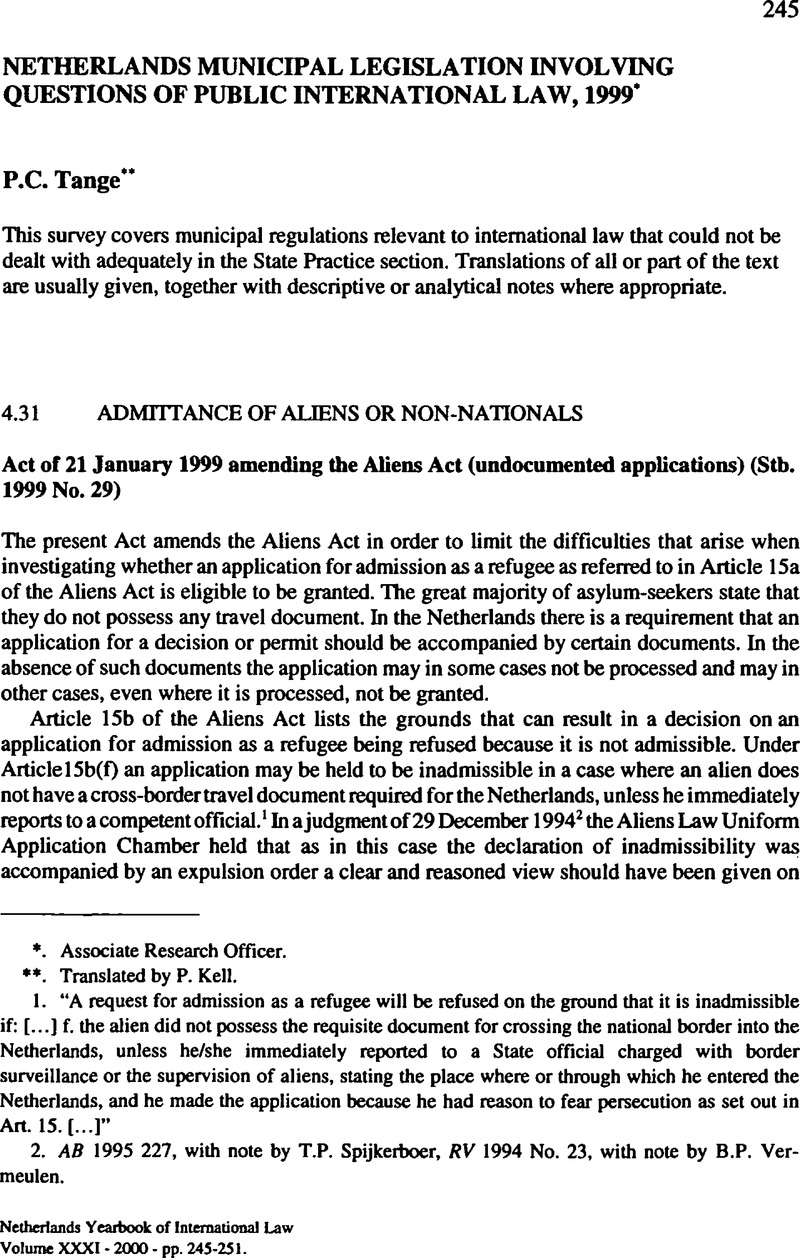No CrossRef data available.
Published online by Cambridge University Press: 07 July 2009

1. “A request for admission as a refugee will be refused on the ground that it is inadmissible if: […] f. the alien did not possess the requisite document for crossing the national border into the Netherlands, unless he/she immediately reported to a State official charged with border surveillance or the supervision of aliens, stating the place where or through which he entered the Netherlands, and he made the application because he had reason to fear persecution as set out in Art. 15. […]”
2. AB 1995 227, with note by Spijkerboer, T.P., RV 1994 No. 23Google Scholar, with note by B.P. Vermeulen.
3. Convention of 28 July 1951 189 UNTS p. 137; Trb. 1975 No. 131, amended by Protocol of 31 January 1967, 606 UNTS p. 267; Trb. 1967 No. 76.
4. It is, incidentally, assumed in the present Act that if the documents necessary for assessment of the application for admission are missing it is up to the alien to make a plausible case as to why this cannot be attributed to him.
5. Stb. 1999 No. 32.
6. Lower House 1997/98 – 25 741 p. 4
7. Lower House 1997/98 – 25 741 No. 3 p. 3
8. Art. 2 para. 1
9. Art. 1 para. 2
10. Decree of 14 October 1999 to impose further rules on facilities for remigration (Stb. 1999 No. 446)
11. Decree of 15 March 2000 (Stb. 2000 No. 129)
12. This Interim Decree is of a provisional nature and must be followed by formal legislation.
13. Explanatory Memorandum, Stb. 1999 p. 3
14. Trb. 1983 No. 83
15. Stb. 1996 No. 357
16. For the complete text of the Explanatory Memorandum, see 29 NYIL (1998) pp. 167–180Google Scholar
17. Decree of 13 March 2000, Stb. 2000 No. 167.
18. Stc. 1998 No. 210, see 30 NYIL (1999) p. 274.Google Scholar
19. Under Art. 6 it was prohibited to act in breach of Regulation 1901/98, which included a prohibition on flights of Yugoslav airlines between the Federal Republic of Yugoslavia and the EC. When repealing Council Regulation (EC) No. 1901/98, Council Regulation (EC) No. 1064/1999 adopted a prohibition on flights between the Federal Republic of Yugoslavia and the territory of the EC.
20. Yugoslavia Aviation Sanctions Regulation 1999, Stc. 1999 No. 126, p. 13.
21. The Regulations in question were repealed by Art. 13 of Council Regulation (EC) No. 1294/1999 of 15 June 1999 concerning a freeze of funds and a ban on investment in relation to the Federal Republic of Yugoslavia.
22. Other sanction schemes adopted as a result of prohibitions introduced by the Council of the European Communities against the Federal Republic of Yugoslavia concern oil and oil products. (Yugoslavia Oil and Oil Products Sanctions Regulation 1999, Stc. 1999 No. 106, p. 7 and No. 208, p. 7).
23. OJ 1998 L 215, p. 1.Google Scholar
24. OJ 1997 L 309, p. 1.Google Scholar
25. See 28 NYIL (1997) p. 318Google Scholar
26. See 31 NYIL (2000) p. 182.Google Scholar
27. On 5 April 1999 effectuated by the Secretary General of the United Nations.
28. 29 November 1993, OJ 1993 L 295, p. 1.Google Scholar
29. 26 NYIL (1995) p. 322Google Scholar. Repealed by Regulation of 19 April 1999, Stc. 1999 No. 75.
30. 1999/624/GBVB, OJ 1999 245, p. 53.Google Scholar
31. OJ 1999 L 265.